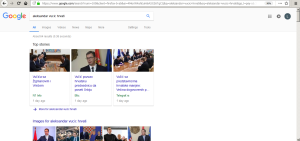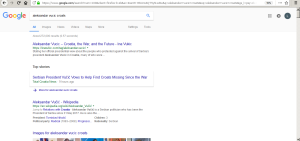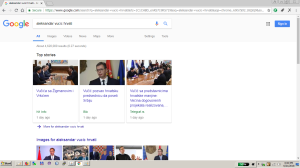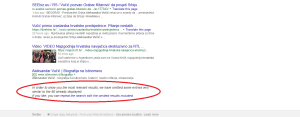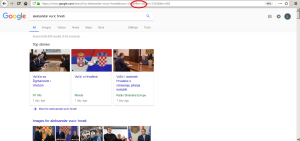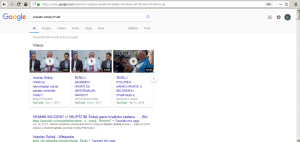Personalized Search and Google Censorship
Recently a friend told me that all results were removed from Google for searches related to current Serbia’s leader Aleksandar Vucic (AV) and Serbia’s neighbours Croats.
AV used to say many bad things in regards to Croats during the wars in ’90s, and since he is pro EU oriented, this localized censorship can be perceived as an attempt to ‘help’ forget the past and love thy neighbour.
Very interesting case of censorship. For a query from Belgrade, Serbia, Google returns 63 results only for a phrase in Serbian language aleksandar vucic hrvati, while quarter of a million of results for English language query where ‘hrvati’ is substituted with ‘croats’: aleksandar vucic croats.
At the same time, for unsigned users and for proxies from other countries it has millions of results for Serbian query as well.
Interestingly, for a localized version (from Belgrade but using .com) it warns you there are more results which are ‘very similar’ to those 80 displayed, and once you click it, you see millions of results!
Really?
Interestingly, if you specify the time range for the decade of 1990-1999, clicking on ‘show similar’ does not expand to millions but keeps it below two dozen results.
I did few more searches to see if there is some systemic issue with the algorithm, in which case it may not be localized censorship. A very natural query to look for was for his mentor, also very anti-croat oriented politician: vojislav seselj hrvati. Almost half a million results, right away, without being ‘very similar’.
Given that Google is trying to hide some information here from local population, a good question to ask is what is their interest in doing that? Who gets anything if local population forgets their history, and the biography of their current leader? Who is trying to make it harder for his opponents to find arguments they can use against him. People do change and what we do in our past may not define who we are at the present… or does it not? Do people change so much? Or do their drastic changes speaks something about them?
Aside from the fact that any kind of censorship is unacceptable, I am more interested in motives here, as people often ask me something along the lines “so what if they know everything I write or say or do, why would anyone be interested in me”. One of my common replies is “if you are not creative enough to figure out how that information could be (mis)used, don’t think that someone else is not either”, or another one “if that information is so useless, why some companies pay billions of dollars to buy other companies which possess such useless personal information”.
The third common answer I provide is directly related to above case study. On the individual level, by biasing the information they show you, in relation to the psychological profile they have about you, they try to modify your world views, your habits, your lifestyle. And maybe worse. And since many individuals make up a society, they want to change things within societies as well.
So again, why would a western based entity (i.e. Google or whoever has invested in it) bother to filter information from users in some small country (i.e. Serbia). I will list here both some potentially positive and potentially negative motives (as in, a parent manipulates a child sometimes wishing him well, like making him eat a lunch through a play):
- They want to make it easier for local people to forget wars, recent dark history, their leaders’ infamous periods of lives.
- They assume which leaders are good and want to make it harder to their opponents to remind them of misdeeds.
- They really believe in EU they are trying to promote / impose.
Above were few ‘good’ intentions, yet as we know even that is not enough as “The road to hell is paved with good intentions”.
- There are theories circulating around that EU is a project for destruction of nation states, through imposition of another layer of bureaucracy which will interfere into national affairs. It is easier for multinational corporations like Monsanto to impose their GMO through a single EU entity, than to bribe every single government (as they have already done a few times).
- This AV guy keeps nodding his head to all EU people ask from him, and he is even proud for doing that. Even last weeks he keeps repeating “we did everything EU asked of us, and Kosovo didn’t do a single promise they signed”. So how (un)intelligent a guy must be to keep yielding to demands without sticking to a single leverage he has? So as a very conforming guy, West has an interest in keeping him there and making it harder for people to find bad stuff about him on the web.
- It is imaginable that a person or a company can pay Google to help with reputation management by removing some results from SERPs.
- It could have been possible that the army of AV bots has manually tagged for copyright so many results, but then they would not show for users from other parts of the world either.
So though AV yields to EU, he does not yield to Google, and why would Google care? This is the confusion. If you consider Google a separate corporate entity though, detached from politics. If you do not, then things again become more clear.
related:
Category: censorship, social media Comment »
